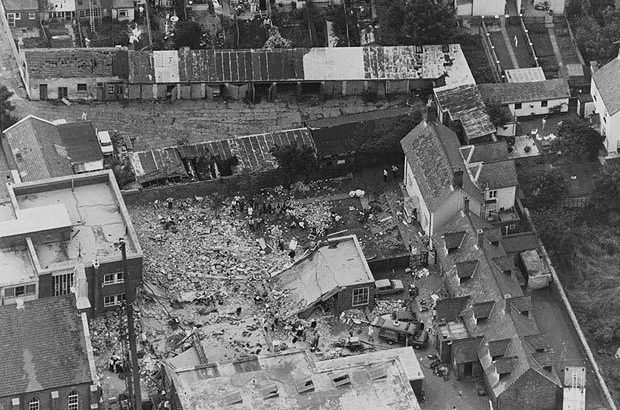A retired nurse died last month in a small hospital in Deal, Kent and many local people paid tribute to her. She was Mrs Maureen Bane, aged 76, and she had been the team leader coping with the victims of the IRA attack on the Deal bandsman in September 1989.
On the morning of September 22, an IRA bomb exploded in the Royal Marines’ recreational changing room at Deal, killing 11 marines – mostly newly-recruited teenagers – and wounding another 21. The marines were a soft target: ceremonial bandsmen at the School of Music who had not participated in any military activities. Every summer in Deal, the band entertained the community: it still does, but now as a memorial to the victims.
Maureen Bane was said to have given “first class care” at the Deal hospital when bomb victims were brought in: in addition to the injured, many local people were very shocked and distressed. (The fatally injured were subsequently brought to larger hospitals at Canterbury and Dover.) Mrs Bane was awarded an MBE for her services to nursing and to the community.
The Provisional IRA chose to attack the Deal bandsmen as part of their campaign to rid Northern Ireland of British troops, although the Deal teenagers had never served in Northern Ireland and their main interest was in the School of Music attached to the marines.
No one was ever arrested or charged with this bombing, which the Labour leader Neil Kinnock called “an awful atrocity”. I am told that several of the Sinn Féin-IRA Provisionals who were involved in planning the Deal attack are alive and well and blithely living in Ireland, north and south.
The peace process moved forward and such events were consigned to the past: people have to accept what has occurred and try to rebuild for the future. But for many years afterwards, when Deal pier displayed a cluster of European flags, the Irish tricolour never appeared amongst them.
Maureen Bane’s funeral will be held at St Mary’s Anglican Church, Walmer, Kent, this Friday, June 15. If Mary-Lou MacDonald can take some time off from campaigning for abortion rights in Northern Ireland, perhaps it would be a conciliatory gesture to send a bouquet of flowers for Mrs Bane’s funeral. There will also be a memorial service and a celebration of Maureen Bane’s life to be announced shortly: another chance for Sinn Féin to show its repentance for the killing actions of the Provisional IRA?
And when the 30th anniversary of the Deal bandsmen’s deaths and injuries occurs in 2019, perhaps President Michael D. Higgins – should he still be at the helm – will hold a national event apologising to the families of Deal for what Irishmen and women did. He has shown himself to be good at this kind of gesture.
Seeds of Faith blossom
As reported in The Irish Catholic last week, the former British MP who served a jail sentence for perjury, Jonathan Aitken, aged 75, is to be ordained in the Church of England. An Irish nun played a formative part in Jonathan’s life, as he recounts in his autobiography, Porridge and Passion.
When he was a young child his family was living in Dublin and he contracted TB. He was admitted to Cappagh Hospital, where he had to lie in bed for three-and-a-half years. There, he came under the care of a Sr Mary Finbar, who impressed him with her kindness and Faith, and who he has never forgotten.
He has had his ups and downs and wayward paths, but finally, Sr Mary Finbar’s influence is leading Jonathan to become a prison chaplain.l When Dame Maggie Smith – who appeared as the commanding dowager in Downton Abbey – was asked what advice she would give to her younger self, she replied: “If in doubt – don’t!” She added that there is a Latin version of this aphorism, which I believe is: Cum dubito desisto. Good counsel!
How Mná na hÉireann foiled George’s plan
In Ireland, the Catholic Church is blamed for everything that goes wrong, and is seldom given credit for aspects of history in which the nation takes pride. Currently, there’s a celebration around the women – Mná na hÉireann – who did so much to object to Lloyd George’s plan to impose conscription on Ireland in 1918 (ill-judged as well as morally wrong).
Yes, women played an active part in the anti-Conscription campaign. But Catholic Ireland – which usually included Mná na hÉireann – played the central role. A national Novena to Our Lady of Lourdes was organised and it swept the country. The anti-Conscription cause was moral as much as political: no man or woman should be forced into military service.
The anti-Conscription campaign was a hub moment of national unity in 1918 – not to be achieved again for many a long day.


 Mary Kenny
Mary Kenny The aftermath of the Deal bombing
The aftermath of the Deal bombing 